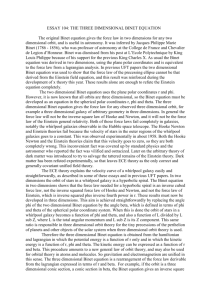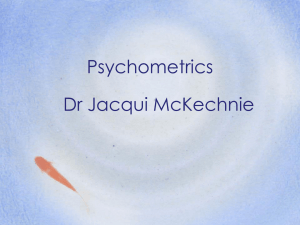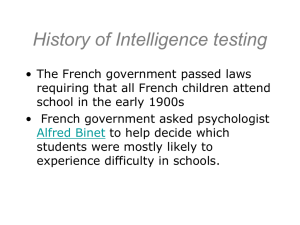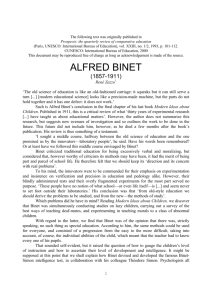ALFRED BINET
advertisement
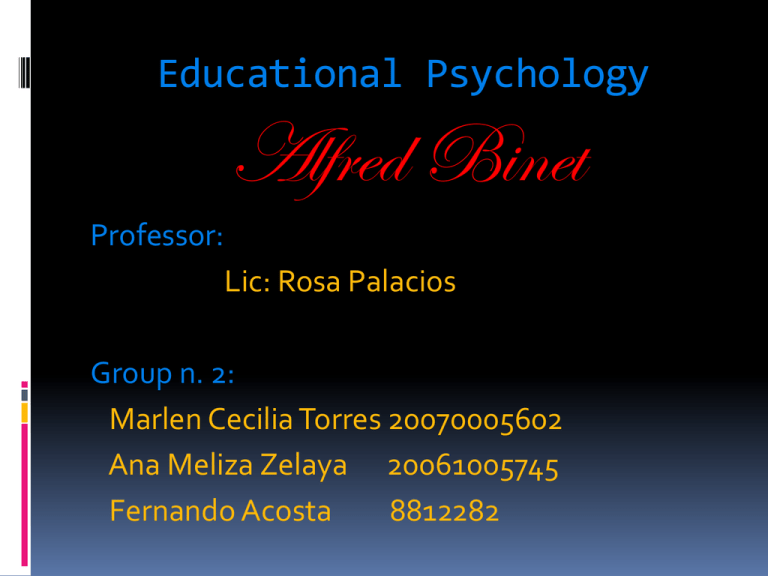
Educational Psychology Alfred Binet Professor: Lic: Rosa Palacios Group n. 2: Marlen Cecilia Torres 20070005602 Ana Meliza Zelaya 20061005745 Fernando Acosta 8812282 ALFRED BINET Alfred Binet was born on July, 11th 1857 in Nice France. His father was a physician, and his mother an artist. They divorced when he was young. Binet moved to Paris with his mother. After graduating from law school in 1878, Binet followed his father's footsteps and enrolled in medical school. He began to study science at Sorbonne, but soon began educating himself in psychology by reading works by Charles Darwin and John Stuart Mill. CAREER Researcher, neurological clinic, Salpertriere Hospital Paris. ( 1883-1889) Researcher and Associate Director, Laboratory of Experimental Psichology , Sorbonne University. (1891-1894) Member, Commission on the education of retarded children, appointed by the french Ministry of Public Instruction.(1904) INFLUENCES Student of: Charcot Influenced by: Mill, Simon, Terman, Goddard Time Period: The Great Schools’ Influence History of the Stanford – Binet Intelligence Scale It is a descendant of the Binet-Simon scale which was developed in 1905 and became the first intelligence test, it was developed in 1916. It was created by Alfred Binet with the help of his assistant Theodore Simon. It takes 45 to 90 minutes to be applied, but can take as long as two hours and 30 minutes depending on how many areas of intelligence are measured and with what depth. MAJOR CONTRIBUTIONS The major work that he developed was The Stanford- Binet Intelligence Scale: The scale is a standardized test that measures intelligence and cognitive abilities in children and adults, from age two through mature adulthood. It is used to provide educational planning and placement, neuropsychological assessment, and research. “The Stanford Binet Intelligence Scale” is generally administered in a school or clinical setting. The scale’s area scores include: Verbal Reasoning Abstract/Visual Reasoning Quantitative Reasoning, and Short-Term Memory. In constrast to his contemporaries who supported the measurement of physical features or a single factor as an assessment of intelligence, Binet suported a functional, multidimentional view of intelligence that emphasized reasoning and comprehension. Because of his unique approach to studying intelligence, the Paris school system asked Binet to develop a test that could be used to identify children who would benefit from special education classes. In 1905 Binet and his collaborator, Theophile Simon, responded to this request by creating the first intelligence test, the BinetSimon Scale. Binet revised the scale in 1908 and again in 1911. A second focus of Binet's research was the cognitive development of his two daughters, Alice and Madeleine. His extensive observations and experimental studies of his daughters allowed him to develop several theories about cognitive development. Example followed later by Jean Piaget. An important milestone in Binet's career was the creation of the first Laboratory of Experimental Pedagogy. The purpose of this lab was to develop a systematic line of experimental research with children and to provide training for teachers on how to educate mentally challenged children. The establishment of his laboratory was a major event in the formation of the field of Child Psychology. IMPORTANT WORKS AND PUBLICATIONS The psychology of reasoning, based on experimental researches in hypnotism (Chicago, Open court publishing company, 1899). Animal Magnetism (New York, D. Appleton and company, 1888) Etudes de psychologie expérimentale (1888). Les altérations de la personnalité (Paris: F. Alcan, 1892). Perception intérieure (1887). La Suggestibilité (Paris: Schleicher, 1900). Etude expérimentale de l'intelligence (1903). The Mind and the Brain (London: Kegan Paul, Trench, Trübner & co. ltd.). Les révélations de l'écriture d'après un contrôle scientifique (Paris: Félix Alcan, 1906). Binet, A. & Simon, Mentaly defective children (1907). (Paris, A. Colin, 1907). Les idées modernes sur les enfants (Paris, E. Flammarion, 1909). L'intelligence des imbecile (L'année psychologique, 15, 1–147, 1909). Alfred Binet was one of the founding editors of L'année psychologique, a yearly volume comprising original articles and reviews of the progress of psychology still in print. 1911 Binet died just after the third version of Binet-Simon test was published. 1917 Free Society for the Psychological Study of the Child voted to change their name to La Societe Alfred Binet. 1984 Binet's development of the intelligence test was named one of twenty of the 20th century's most significant developments or discoveries in the journal Science. FAMOUS QUOTE: “The scale, properly speaking, does not permit the measure of the intelligence, because intellectual qualities are not superposable, and therefore cannot be measured as linear surfaces are measured.” The quote on the previous diapositive is a clear enunciation of the modern conception of intelligence measuring. Such conception asserts the fact that the IQ is not enough basis for the measuring of intelligence, but the ability to use intrinsic skills and apply them in the solution of problems and facing obstacles make up that basis. Bibliography References Bergin, D. A., & Cizek, G. J. (2001). Alfred Binet. In J. A. Palmer (Ed.), Fifty major thinkers on education: From Confucius to Dewey (pp. 160-164). London: Routledge. Fancher, R. E. (1985). The intelligence men: Makers of the IQ controversy. New York: W. W. Norton & Company. Siegler, R. S. (1992). The other Alfred Binet. Developmental Psychology, 28, 179-190. White, S. (2000). Conceptual foundations of IQ testing. Psychology, Public Policy, and Law, 6(1), 33-43. Wolf, T.H. (1973). Alfred Binet. Chicago: University of Chicago Press. Image Courtesy of the National Library of Medicine http://www.indiana.edu/~intell/binet.shtml http://www.reference.com/browse/alfred+binet


